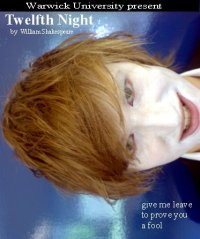
June 28, 2007, by Peter Kirwan
Twelfth Night (WSAF) @ Warwick Arts Centre
There are dangers to taking on Shakespeare. People are obviously drawn to the history, the accessibility, the guaranteed audiences and the copyright-free texts, but sometimes the dangers get overlooked. Perhaps the most overlooked problem when tackling a Shakespeare play is the question of “Why?”. When every play has such a rich performance history, why do it again? What is new about your production? Why do we need this production now?
This is a problem more easily overcome when tackling one of the more obscure plays, as one group are doing in Warwick Student Arts Festival with ‘Cymbeline’, a play which has had no student performances in local memory for quite some time, if ever. However, when tackling one of the more canonical texts, it becomes a different matter. If you’re going to do ‘Hamlet’ or ‘Macbeth’, for example, you need to know why. Tonight’s production of ‘Twelfth Night’, the other Shakespearean offering at WSAF unfortunately failed to make a case for itself.
I don’t know if director Alex Knight saw Filter’s production of ‘Twelfth Night’ during the Complete Works Festival, but the two invite close comparison. Filter cut the play to an hour and five minutes, Knight to an hour and a half. Filter performed it with six actors, Knight with seven. Both companies performed in studio sized spaces, both doubled Viola and Sebastian. This had the unfortunate effect, from my perspective, of making tonight’s production seem highly derivative and, without the resources of a professional company, inferior.
The nature of WSAF means that productions have short rehearsal periods, low technical capabilities and very little funding, which obviously limits capabilities to an extent. However, several recent student productions have recently demonstrated how excellent drama can be created on a shoestring with a strong company. It’s a shame, because I think a good production lay at the heart of this performance, but there was clearly still a long way to go.
‘Twelfth Night’ boasted on its Facebook group of one of Warwick’s best casts, which is somewhat of an overstatement. The 90 minute running time was partly achieved through cutting, but mostly managed by the company speaking their parts at a gallop, with little inflection, expression or, in some cases, any sense of interest in what they were saying. The plot raced so fast (yet keeping all its major elements) that a prior knowledge of the play was needed to keep up, and a steadier approach would have given the actors time to inject some emotion or feeling into their lines.
It didn’t help that the approach to the play was a relatively serious one, with a sombre mood throughout. While this could have worked, the lack of time to engage with or get to know any of the characters meant that the audience lacked that connection which would have allowed us to care what was going on. Viola particularly suffered here, with Claire Trevien providing a cocky, unlikable Viola/Cesario who welcomed and dismissed everyone she spoke to in seconds and never had time to engage with anyone, either on stage or in the audience. The doubling of Viola and Sebastian, an interesting (if not unique) staging device, was here ultimately resolved with a full-length mirror, resulting in the ultimate image of Sebastian standing with Olivia while Orsino talked into his own reflection- a ridiculous image that removed the central character at the climax of her story. There was potential here, but it was clearly underdeveloped and the moment was swiftly passed by, thus forestalling any embarrassment.
The other particularly irritating device was a clapping, that ‘off-stage’ actors did in unison while certain scenes were happening on-stage, such as Malvolio’s reading of the letter. I honestly don’t know what the intended effect was of these random rhythms, but in practice they drowned out all dialogue from where I was sitting (on the front row) and seemed relatively arbritrary in their execution. I found myself, to my disappointment, longing for an interval so I could soothe the headache from straining to hear the dialogue, and was dismayed to realise that the whole play was going to be done in one act.
It wasn’t all bad. Tom Steward’s Sir Toby was funny, and there was one very funny moment towards the end (which slips my mind now) that had me laughing out loud. Sam Kinchin-Smith’s Feste, while weak onstage, had an excellent offstage presence, watching with a wry smile from a keyboard and mouthing along to other character’s lines, lending the character an interesting metatheatrical element which was sadly not carried through in the play proper. Overall, though, this was a very weak production which I really wanted to like, but lent nothing new to the play and was marred by poor performances.
No comments yet, fill out a comment to be the first

Leave a Reply